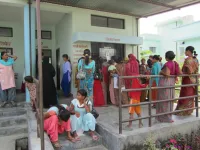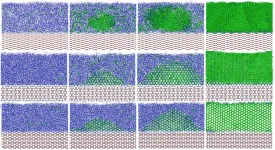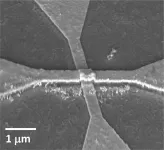(Press-News.org) Detailed, new analysis published this week in the British Medical Journal (BMJ) Open highlights significant concerns about a growing issue of sex selective abortion of girls in Nepal.
Drawing on census data from 2011 and follow-on survey data from 2016, the social scientists estimate that roughly one in 50 girl births were 'missing' from records (i.e. had been aborted) between 2006-11 (22,540 girl births in total). In the year before the census (June 2010 - June 2011) this had risen to one in 38.
For certain areas of the country, the practice was more widespread. In Arghakhanchi, the most affected district, one in every six girl births were 'missing' in census data. In the Kathmandu Valley, Nepal's main urban centre, around 115 boys are born for every 100 girls. Without sex selection we would expect only 105 boys born for every 100 girls.
It has been widely acknowledged over many years that sons have been preferred to daughters in Nepal. Whereas boys are seen economic and social assets, in some parts of the country girls are more often regarded as a financial burden, requiring a dowry and leaving their family home upon marriage.
However, it is only since abortion legislation in 2002 and the widespread availability of ultrasounds from 2004 onwards that there has been the potential to selectively abort female foetuses. There has been growing concerns about this practice over recent years, but to date little empirical research about the scale of the issue.
Importantly, abortions due to the results of sex determination tests are both illegal and carry prison sentences in Nepal. But, the researchers writing in the BMJ-Open, suggest that these laws are not effectively enforced. It is estimated that more than half of abortions carried out in 2014 were illegal, so direct legislation only has limited scope to solve this issue.
Deeper analysis by the team found that sex ratios were skewed, with women who were richer and more highly educated more likely to undertake sex selective abortion. They also found that, in districts where more sex-selection occurred, girls were more likely than boys to die by age five, indicating discrimination both before and after birth.
Lead author, Dr Melanie Channon from the University of Bath's Department of Social & Policy Sciences explained: "As fertility falls and urbanisation increases, there is more access to prenatal sex identification technology in Nepal. Our study shows some of the impact this has had over recent years, and we expect there will be a 'trickle-down' of ability to select the sex of a baby from the wealthiest and most educated as the technology becomes more widely available and more affordable. Put simple and starkly, without concerted effort, there will be an increase in sex-selective abortions in Nepal.
"It is important to stress that the solution to this growing issue is not to ban abortion or ultrasound tests during pregnancy. Many lives have been - and continue to be - saved by these policies. The only lasting solution is to dismantle the deeply rooted gender inequity found across the country in order that people no longer wish to selectively abort female foetuses. The government in Nepal needs to take a lead on this, combining media campaigns with legal and political measures which address the issue of gender equity across a range of themes in the country."
Second author of the paper Dr Mahesh Puri from the Center for Research Environment Health and Population Activities (CREHPA) in Nepal, added: "In view of the easy accessibility to prenatal sex-determination technologies, religious and socio-economic values given to sons, coupled with lack of focussed policy and programme to address gender inequality and weak enforcement of law relating to sex determination tests, the practice of sex selective abortion could further increase in the future.
"Targeted interventions to enable gender equality, increase value of girls, as well as social and economic incentives for vulnerable girls, such as conditional cash transfer schemes and effective enforcement of the law would be required."
The team behind the report urge the Nepali government to recognise this issue and adapt a multi-sectoral national strategy to combat it.
INFORMATION:
Anyone who has watched an infant's eyes follow a dangling trinket dancing in front of them knows that babies are capable of paying attention with laser focus.
But with large areas of their young brains still underdeveloped, how do they manage to do so?
Using an approach pioneered at Yale that uses fMRI (or functional magnetic resonance imaging) to scan the brains of awake babies, a team of university psychologists show that when focusing their attention infants under a year of age recruit areas of their frontal cortex, a section of the brain involved in more advanced functions that was previously thought to be immature in babies. The findings were ...
At the heart of clouds are ice crystals. And at the heart of ice crystals, often, are aerosol particles - dust in the atmosphere onto which ice can form more easily than in the open air.
It's a bit mysterious how this happens, though, because ice crystals are orderly structures of molecules, while aerosols are often disorganized chunks. New research by Valeria Molinero, distinguished professor of chemistry, and Atanu K. Metya, now at the Indian Institute of Technology Patna, shows how crystals of organic molecules, a common component of aerosols, can get the ...
Observations of groups of wild bonobos, reported in Scientific Reports, suggest that two infants may have been adopted by adult females belonging to different social groups. The findings may represent the first report of cross-group adoption in wild bonobos, and potentially also the first cases of cross-group adoption in wild apes.
Bonobos form social groups of multiple males and females that sometimes temporarily associate with one another. Nahoko Tokuyama and colleagues observed four groups of wild bonobos between April 2019 and March 2020 in the Luo Scientific Reserve in Wamba, Democratic Republic of the Congo. The authors identified two infants whom ...
Newly excavated skeletal remains of an ankylosaurid -- a large armoured herbivore that lived during the Cretaceous Period -- may indicate that members of this family of dinosaurs were able to dig, according to a study published in Scientific Reports. The specimen, known as MPC-D 100/1359, may further our understanding of ankylosaurid behaviour during the Late Cretaceous (84-72 million years ago).
Yuong-Nam Lee and colleagues excavated the skeletal elements of MPC-D 100/1359 from a deposit of the Baruungoyot Formation in the southern Gobi Desert, Mongolia, ...
UC Santa Cruz researchers published a new study--in collaboration with UC Water and the Sierra Nevada Research Institute at UC Merced--that suggests covering California's 6,350 km network of public water delivery canals with solar panels could be an economically feasible means of advancing both renewable energy and water conservation.
The concept of "solar canals" has been gaining momentum around the world as climate change increases the risk of drought in many regions. Solar panels can shade canals to help prevent water loss through evaporation, and some types of solar panels also work better over canals, because the cooler environment keeps them from overheating. ...
Training neural networks to perform tasks, such as recognizing images or navigating self-driving cars, could one day require less computing power and hardware thanks to a new artificial neuron device developed by researchers at the University of California San Diego. The device can run neural network computations using 100 to 1000 times less energy and area than existing CMOS-based hardware.
Researchers report their work in a paper published Mar. 18 in Nature Nanotechnology.
Neural networks are a series of connected layers of artificial neurons, where the output of one layer provides the ...
From swallowing pills to injecting insulin, patients frequently administer their own medication. But they don't always get it right. Improper adherence to doctors' orders is commonplace, accounting for thousands of deaths and billions of dollars in medical costs annually. MIT researchers have developed a system to reduce those numbers for some types of medications.
The new technology pairs wireless sensing with artificial intelligence to determine when a patient is using an insulin pen or inhaler, and flags potential errors in the patient's administration method. "Some past work reports that up to 70% of patients do not ...
A study by Monash University has uncovered that liver metabolism is disrupted in people with obesity-related type 2 diabetes, which contributes to high blood sugar and muscle loss - also known as skeletal muscle atrophy.
Using human trials as well as mouse models, collaborative research led by Dr Adam Rose at Monash Biomedicine Discovery Institute has found the liver metabolism of the amino acid alanine is altered in people with obesity-related type 2 diabetes. By selectively silencing enzymes that break down alanine in liver cells, high blood sugar and muscle loss can be reversed by the restoration of skeletal muscle protein synthesis, a critical determinant of muscle size and strength.
The research, published today in Nature Metabolism, has shown the altered liver metabolism ...
Scientists have witnessed bonobo apes adopting infants who were born outside of their social group for the first time in the wild.
Researchers, including psychologists at Durham University, UK, twice saw the unusual occurrence among bonobos in the Democratic Republic of Congo, in central Africa.
They say their findings give us greater insight into the parental instincts of one of humans' closest relatives and could help to explain the emotional reason behind why people readily adopt children who they have had no previous connection with.
The research, led by Kyoto University, in Japan, is published in the journal Scientific Reports.
Researchers observed a number of bonobo groups over several years in the Wamba area of ...
Researchers at Seattle's Institute for Systems Biology and their collaborators looked at the electronic health records of nearly 630,000 patients who were tested for SARS-CoV-2, and found stark disparities in COVID-19 outcomes -- odds of infection, hospitalization, and in-hospital mortality -- between White and non-White minority racial and ethnic groups. The work was published in the journal Clinical Infectious Diseases.
The team looked at sociodemographic and clinical characteristics of patients who were part of the Providence healthcare system in Washington, Oregon and California. These ...


